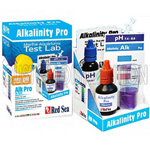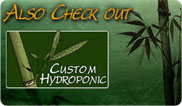Store >
Test Kits >
Kh Alkalinity | Hardness Test Kits >
[ Alkalinity PRO Mini-Lab Test Kit, Red Sea ]
Alkalinity PRO Mini-Lab Test Kit, Red Sea
Product #TK-RS20115
Availability: No longer available
Description:
Red Sea Alkalinity PRO test kit.
Brand: Red Sea
Brand: Red Sea
Product Information
- Includes free pH test kit
- Easy to use
- Titration test accurate to 0.04 Meq/L
Introduction to pH & Alkalinity
The pH is a very important parameter in the biology of aquatic organisms. It is a measure of the acidity or basicity of the water. The scale runs from zero to 14. Zero is the most acidic, 7 is neutral and 14 is the most basic. A change of 1 pH unit, for example from 7 to 6, means that the water gets 10 times more acidic.
Due to its chemistry, saltwater is able to absorb a certain amount of acidic matter without a resulting change in pH. The substances in the water that do this are called buffers. The ability of water to withstand changes in pH is called buffer capacity. Based on a method of measuring buffer capacity it is referred to as the alkalinity of seawater. In some of the literature alkalinity is termed "Carbonate Hardness" or "KH Carbonate Buffer". This is exactly the same measurement as is measured in the Alkalinity Mini-Lab Test.
pH and alkalinity
The pH of natural seawater varies geographically in the world's oceans between 8.1 and 8.4. On a local scale the pH is however remarkably stable. This is due to dissolved buffers (mainly bicarbonates), which prevent pH changes. Because of the enormous volume of the ocean, a nearly inexhaustible stock of buffers are present: the sea can take up large amounts of acids, without a noticeable change in pH.
Compared to the sea the volume of a marine aquarium is very limited and therefore the alkalinity is also limited. As fish produce acid waste products and as the buffering substances are used up by calcareous algae and invertebrates, the buffer capacity may become so low that the pH could suddenly fall. This would be very dangerous to all organisms in the aquarium.
The alkalinity is measured in so called milli-equivalents of alkaline substances (for example sodium bicarbonate) per liter. These alkaline substances have the power to prevent pH drops. The alkalinity of natural seawater is approximately 2.5 milli-equivalents per liter. This level should also be maintained in the marine aquarium.
A common symptom of an unsuitable pH is pH-stress. Especially in the marine aquarium, unsuitable pH values are very stressful to fish, and increase the chance of the fish being susceptible to disease (marine white spot).
To maintain a correct and stable pH, check the pH and alkalinity weekly.
Recommendations:
A low pH should be corrected by a 10% water change every day until the right pH is reached.
A low alkalinity should be corrected by firstly making a 10% water change. Re-check the alkalinity and if still low, add Reef Success Buff until a normal level can be reached. It is permissable to add Red Sea's Coral Buff.
Maintaining a stable pH and a high buffer capacity of your aquarium can be achieved in several ways.
Change 10% of your aquarium water every week, Red Sea's Red Sea Salt is particularly suitable as it is rich in natural buffers, enabling you to keep the buffer capacity at the optimum level.
Weekly water changes should be accompanied by regular addition of a buffering solution such as Red Sea's Coral Buff supplement which contains carbonates and bicarbonates of Sodium, Potassium, Calcium, Magnesium and Boron in a balanced formula.
- Weight: 2 lb
- Height: 6 in
- Width: 4 in
- Depth: 2 in
TK-RS20115
Product Rating
- No reviews for this product have been submitted





 Larger View
Larger View

